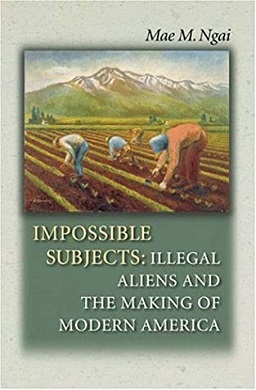
Immigration to the United States has been a major source of population growth and cultural change throughout much of its history. In absolute numbers, the United States has by far the highest number of immigrant population in the world, with 50,661,149 people as of 2019. This represents 19.1% of the 244 million international migrants worldwide, and 14.4% of the United States' population. In 2018, there were almost 90 million immigrants and U.S.-born children of immigrants in the United States, accounting for 28% of the overall U.S. population.

The Immigration and Nationality Act of 1965, also known as the Hart–Celler Act and more recently as the 1965 Immigration Act, is a landmark federal law passed by the 89th United States Congress and signed into law by President Lyndon B. Johnson. The law abolished the National Origins Formula, which had been the basis of U.S. immigration policy since the 1920s. The act formally removed de facto discrimination against Southern and Eastern Europeans as well as Asians, in addition to other non-Western and Northern European ethnicities from the immigration policy of the United States.
United States v. Wong Kim Ark, 169 U.S. 649 (1898), was a landmark decision of the U.S. Supreme Court which held that "a child born in the United States, of parents of Chinese descent, who, at the time of his birth, are subjects of the Emperor of China, but have a permanent domicile and residence in the United States, and are there carrying on business, and are not employed in any diplomatic or official capacity under the Emperor of China", automatically became a U.S. citizen at birth. This decision established an important precedent in its interpretation of the Citizenship Clause of the Fourteenth Amendment to the Constitution.

The Immigration Act of 1924, or Johnson–Reed Act, including the Asian Exclusion Act and National Origins Act, was a federal law that prevented immigration from Asia and set quotas on the number of immigrants from Eastern and Southern Europe. It also authorized the creation of the country's first formal border control service, the U.S. Border Patrol, and established a "consular control system" that allowed entry only to those who first obtained a visa from a U.S. consulate abroad.

Operation Wetback was an immigration law enforcement initiative created by Joseph Swing, the Director of the United States Immigration and Naturalization Service (INS). The program was implemented in June 1954 by U.S. Attorney General Herbert Brownell. The short-lived operation used military-style tactics to remove Mexican immigrants—some of them American citizens—from the United States. Though millions of Mexicans had legally entered the country through joint immigration programs in the first half of the 20th century and some who were naturalized citizens who were once native, Operation Wetback was designed to send them to Mexico.
Immigration reduction refers to a government and social policy in the United States that advocates a reduction in the amount of immigration allowed into the country. Steps advocated for reducing the numbers of immigrants include advocating stronger action to prevent illegal entry and illegal migration, and reductions in non-immigrant temporary work visas. Some advocate tightening the requirements for legal immigration requirements to reduce numbers, or move the proportions of legal immigrants away from those on family reunification programs to skills-based criteria.

Jeremiah Whipple Jenks (1856–1929) was an American economist, educator, and professor at Cornell University, who held various posts in the United States government throughout his career. He served as a member of the Dillingham Immigration Commission from 1907 to 1914 in which he led research projects on the state of immigration to the US.

Saskia Sassen is a Dutch-American sociologist noted for her analyses of globalization and international human migration. She is a professor of sociology at Columbia University in New York City, and the London School of Economics. The term global city was coined and popularized by Sassen in her 1991 work, The Global City: New York, London, Tokyo.

The California Alien Land Law of 1913 prohibited "aliens ineligible for citizenship" from owning agricultural land or possessing long-term leases over it, but permitted leases lasting up to three years. It affected the Chinese, Indian, Japanese, and Korean immigrant farmers in California. Implicitly, the law was primarily directed at the Japanese. It passed 35–2 in the State Senate and 72–3 in the State Assembly and was co-written by attorney Francis J. Heney and California state attorney general Ulysses S. Webb at the behest of Governor Hiram Johnson. Japan's Consul General Kametaro Iijima and lawyer Juichi Soyeda lobbied against the law. In a letter to the United States Secretary of State, the Japanese government via the Japanese Minister of Foreign Affairs called the law "essentially unfair and inconsistent... with the sentiments of amity and good neighborhood which have presided over the relations between the two countries," and noted that Japan felt it was "in disregard of the spirit of the existing treaty between Japan and the United States." The law was meant to discourage immigration from Asia, and to create an inhospitable climate for immigrants already living in California.
Asian immigration to the United States refers to immigration to the United States from part of the continent of Asia, which includes East Asia, South Asia, and Southeast Asia. Asian-origin populations have historically been in the territory that would eventually become the United States since the 16th century. The first major wave of Asian immigration occurred in the late 19th century, primarily in Hawaii and the West Coast. Asian Americans experienced exclusion, and limitations to immigration, by the United States law between 1875 and 1965, and were largely prohibited from naturalization until the 1940s. Since the elimination of Asian exclusion laws and the reform of the immigration system in the Immigration and Nationality Act of 1965, there has been a large increase in the number of immigrants to the United States from Asia.

Joseph Adna Hill (1860–1938) was an American statistician.

Foreign nationals (aliens) can violate US immigration laws by entering the United States unlawfully or lawfully entering but then remaining after the expiration of their visas, parole, or temporary protected status. Illegal immigration has been a matter of intense debate in the United States since the 1980s.
Illegal immigration is the migration of people into a country in violation of that country's immigration laws, or the continuous residence in a country without the legal right to. Illegal immigration tends to be financially upward, from poorer to richer countries. Illegal residence in another country creates the risk of detention, deportation, and/or other sanctions.

Legislation seeking to direct relations between racial or ethnic groups in the United States has had several historical phases, developing from the European colonization of the Americas, the triangular slave trade, and the American Indian Wars. The 1776 Declaration of Independence included the statement that "all men are created equal", which has ultimately inspired actions and legislation against slavery and racial discrimination. Such actions have led to passage of the 13th, 14th, and 15th Amendments to the Constitution of the United States.

The history of immigration to the United States details the movement of people to the United States from the colonial era to the present day. Throughout U.S. history, the country experienced successive waves of immigration, particularly from Europe and later on from Asia and Latin America. Colonial-era immigrants often repaid the cost of transoceanic transportation by becoming indentured servants in which the new employer paid the ship's captain. In the late 19th century, immigration from China and Japan was restricted. In the 1920s, restrictive immigration quotas were imposed but political refugees had special status. Numerical restrictions ended in 1965. In recent years, the largest numbers of immigrants to the United States have come from Asia and Central America.
Nativism is the political policy of promoting or protecting the interests of "native-born" or established inhabitants over those of immigrants, including the support of anti-immigration and immigration-restriction measures. Despite the name, and in the US in particular, this position is usually held by the descendants of immigrants themselves, and is not a movement led by Indigenous peoples, as opposited to Nativists in Europe who are descended from native peoples such as Celts, Anglo-Saxons or Norsemen.

Impossible Subjects: Illegal Aliens and the Making of Modern America, is a Frederick Jackson Turner Award-winning book by historian Mae M. Ngai published by Princeton University Press in 2004.
Lucy E. Salyer is a professor of history at the University of New Hampshire known for her work on the history of immigration law in the United States.

Madeline Y. Hsu is an American historian known for her scholarship in Chinese American and Asian American history. She is an elected Fellow of the Society of American Historians. She is the eldest granddaughter of the neo-Confucian scholar Xu Fuguan.












